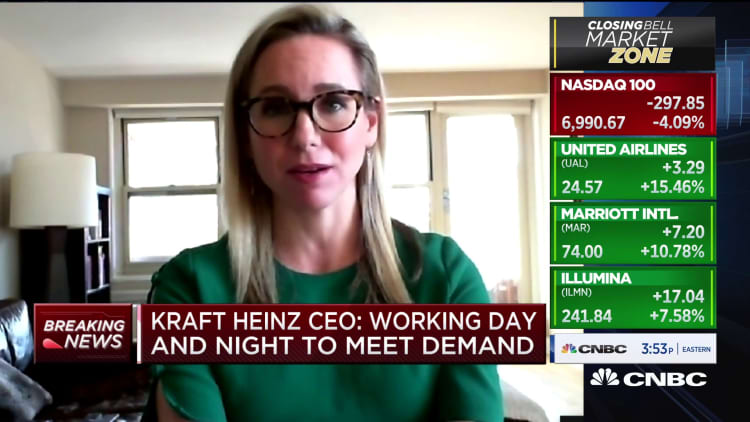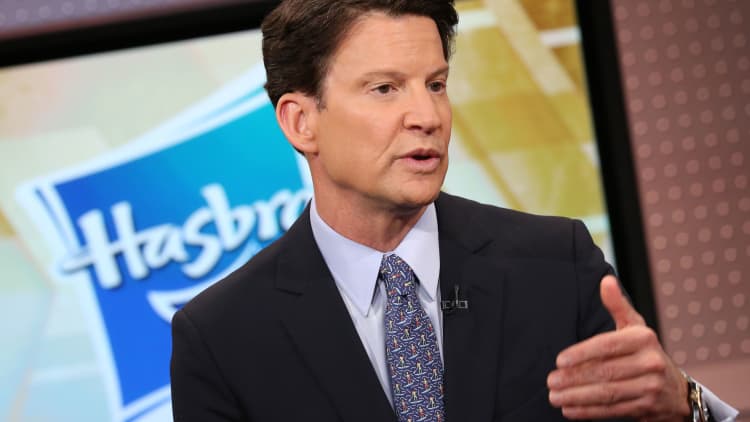In the weeks since the U.S. confirmed its first case of COVID-19, consumer habits have been shifting.
Medical masks, hand sanitizer, gloves and toilet paper have flown off shelves in the U.S., as more people began to look to protect themselves and prepare for long stints isolated in their homes. But, those aren't the only items that consumers are spending money on in stores and online.
In addition to medical supplies, such as cold medicine, thermometers and tissues, and items for the pantry, such as canned goods and bottled water, people have begun shelling out money for entertainment. Board games, puzzles and video games have become popular items.
According to Kit Yarrow, a consumer psychologist, people are currently purchasing items based on three needs: to protect, to entertain and to connect.
"First of all there are our practical needs," she said. "We are home more, so we need more food and we need more provisions."
Canned goods, bottles of water, frozen food, rice and pasta have been cleaned off shelves in recent weeks and grocery stores have had to work quickly to replenish their supply.
Yarrow said that the hoarding of food items makes sense psychologically. As humans feel threatened or anxious, our first instinct is to gain some sort of control over the situation.
"People are resorting to the only action they feel like they can, which is stockpiling," she said.
And it's not just for ourselves. Yarrow said that some people who have to care for children, their own parents or animals are being driven by a sense of guilt to hoard more items.
"It's guilt avoidance," she said. "'I better get more than I need because the consequences if I don't are too horrible to imagine.'"
No one wants to run out of food or cleaning supplies while trying to take care of others, she said.
In addition to food supplies, people have been purchasing gloves, soap, diapers, water filters and jugs, bidets and painter's tape, according to data analysis by Thinknum of Amazon sales from late January through the second week of March.
"I think people are anxious and people feel that this an unsafe world right now," Yarrow said.

It's why they have begun stockpiling items that protect against the virus, as well as items that would protect them against other people; there has been a rise in purchases of security cameras and guns.
"Unsurprisingly, nondiscretionary or essential categories such as food, household products, personal care and health products saw the biggest jump," Deborah Weinswig, CEO and founder, Coresight Research, wrote in a research note Friday about the impact of the coronavirus on consumers.
"More than one-third of all respondents reported buying more food and/or more household products," she said of Coresight's survey of more than 1,000 people March 17-18.
Once folks feel like they are physically safe — have enough food and protection — there is a shift to buying items that are more geared toward emotional well-being.
It's time to entertain and connect
One of the top sellers on Amazon in the last month has been board games and jigsaw puzzles, according to Thinknum. In particular, Sorry, Jenga, Connect 4 and Clue, which all happen to be Hasbro-owned games.
Hasbro CEO Brian Golder told CNBC on Monday that the company is experiencing strong demand during the coronavirus pandemic.
"Overall we are seeing great demand in our products," Goldner said on "Squawk Box." "In fact, our supply chains are back up and running in China," he added.
Goldner said demand for Hasbro's games, such as Monopoly and Operation, and Play-Doh have been particularly strong. He said the company is also planning new products in response to the widespread stay-at-home directives being issued across the country.
Shares of Hasbro closed up more than 12% on Monday but are down about 50% since January. The stock has a market value of about $7.1 billion.
Yarrow said in addition to traditional entertainment such as family games, video games, TV and movies, people have also been gravitating toward crafting and baking to keep themselves busy.
"People have to find stuff to do," she said. "Some of it is game consoles and stuff like that, but a lot of it is people going back to home crafts. Stuff to keep themselves amused, but in a solitary way."
She said yeast has been surprisingly popular and selling out at stores because people have been making more bread at home. Other crafts include embroidery and knitting.
Others have opted to order yoga mats and resistance bands, among other health and fitness items, Thinknum found. Since gyms are closed, people are having to get more creative about their exercise routines.
Yarrow also said that more people have been purchasing condoms.
Consumers are also gravitating more toward technology that allows them to connect with people that they aren't able to physically interact with. She pointed to companies such as Zoom, which have seen a surge not only in consumer interest but also in investor interest.
Shares of Zoom, a video platform designed for conference calls, have skyrocketed more than 125% since January and were up nearly 20% on Monday.
"We are learning new ways of connecting with each other through technology," Yarrow said.
"There is nothing more fundamentally important in our life than connecting with other people and here in this time when we are so anxious and need each other more than ever and we aren't supposed to be together," she said. "It's the human imperative. We are going to find ways to be together."



